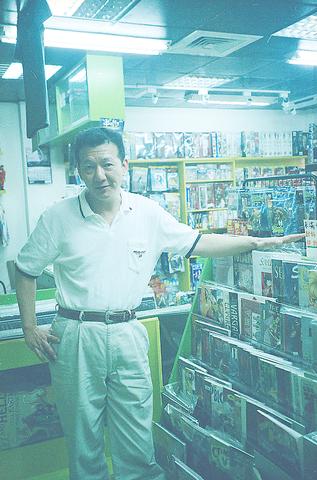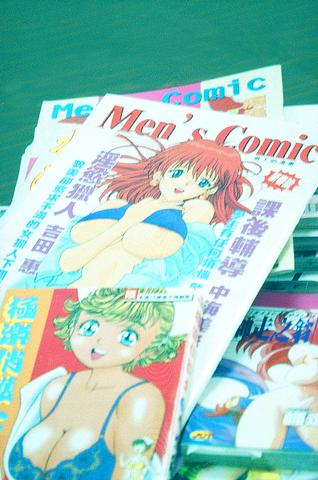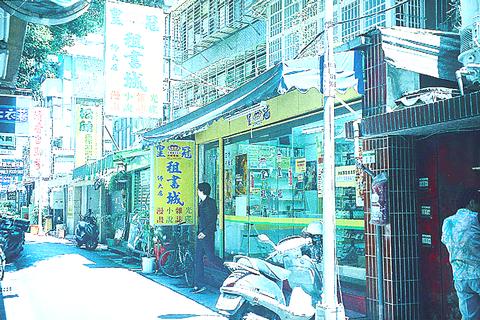On July 1, the nation's three million elementary and junior high school students will begin their 60-day summer vacation. In the weeks leading up to this, police forces across the nation have been sweeping through comic book stores in a quixotic campaign aimed at preventing pornographic material from falling into the hands of students under 18 during their two steamy months off.
These Ching Feng (
Earlier this year the foundation released the findings of a nationwide survey, which were so startling they found their ways onto the front pages of national newspapers. The group discovered that 99.2 percent of the comic-book rental stores visited by officials not only had materials of a pornographic and violent nature on display, they also readily leant such materials to children under 18. Of the stores surveyed, only 3.3 percent adhered to the criteria laid down by the GIO, which state that materials of an erotic or brutal nature should be classified as such and that warning signs should be present to inform patrons as to the nature of the materials.

PHOTO: GAVIN PHIPPS, TAIPEI TIMES
"I don't mind admitting it's a problem within the comic book rental industry. I could name over a dozen stores in the immediate area which don't have signs and which keep pornographic magazines displayed openly," said Mr Hsieh (
"Because about 90 percent of my customers are under 18 and I'm located in a residential area, I don't keep such material on the shelves. I do have it, but people have to ask for it. Which I feel is much better than simply putting up a warning. After all, for many young people a warning sign only makes them more inquisitive as to the content."
Violations widespread

PHOTO: GAVIN PHIPPS, TAIPEI TIMES
It wasn't only comic book stores that fell foul of the law. The foundation looked at publications available at eight chain bookstores, 16 specialized bookstores and two wholesalers. Again the surveyors were stunned.
Of the 125 works scrutinized, only 11 adhered to the guidelines set down by the foundation. These carried a parental guidance warning on the cover and had edited the contents to ensure activities of a sexual or violent nature were not overly explicit. A total of 107 publications had no warning and were deemed unfit for sale to minors. Seven works were found to contain materials of an excessively pornographic or violent nature.
"The law clearly states that if the publishers of materials of a pornographic nature wish to see their magazine or book sold, then they must ensure they don't show or write about certain specific acts," explains Hsu Wen-lin (

PHOTO: GAVIN PHIPPS, TAIPEI TIMES
While parents across the nation were shocked by the recent findings, for Hsu it was just another day at the office. For the past three years Hsu and the foundation's committee have thumbed their way through millions of publications in an effort to make sure social morals pertaining to the publishing of pornographic and violent materials are upheld.
Ruling by committee
Comprised of 20 individuals hailing from the civil service, city governments, educational institutes and publishing houses, the committee meets twice a month. Publications containing explicit material are discussed and a vote taken as to whether the material can be published. While the committee has the final say over what can be published, publishers can appeal decisions, though such appeals are rare.
"There are thousands of publications containing material of an erotic nature released every month. It would be ideal if we could scrutinize all of them, but we can't. There's too many and we don't have the time or the people to do this," explains Hsu.
Along with Japanese comic books containing material of a very explicit nature and bearing cryptic titles like I Don't Like Big Stuff and Vitamin, Hsu and the committee also have to wade through novels, short stories, essays and magazines. While well known publishing houses and publishers of men's magazines such as Playboy and Penthouse voluntarily send up-coming publications to the foundation for scrutiny, many of the publishers of Japanese adult comic books avoid this, so that a large number of such publications find their way into the desks and satchels of school children long before they come to the attention of the foundation.
"The well known publications aren't a problem. Each copy has the official `18 only' stamp and [the publishers] are aware that if they print a photo that shows the female genitalia or depicts a sexual act that they will not be allowed to publish it. They are very smart, though, and they don't mind testing the limits of what is allowed and what isn't allowed," Hsu said.
Massive job
The number of publications scrutinized by the committee at monthly meetings, range from between 50 to 100. Of this, the majority of the publications deemed unfit for publication or in need of editing are locally translated Japanese comic books. The comics make up roughly 80 percent of all the material which arrives in Hsu's office. As no copyright law exists between Taiwan and Japan to cover printed matter, publishers in Taiwan can reproduce any publication without having to secure the rights from the original Japanese publishing company.
Even though much of the foundation's time is consumed trying to keep Japanese and Hong Kong pornographic comic books out of the hands of the young, comics aren't the only such publications to be found in the schoolyard. Penthouse, for example, was ranked the third most popular magazine in a poll taken among students at Chienkuo Senior High School recently behind China Times Weekly (時報周刊) and Commonwealth (天下).
"Considering we condemn the sale of our magazine to children under the age of 18, this was a bit of a surprise," said JJ Tyan (田振駿), editor in chief of Penthouse Taiwan.
Since the magazine was launched in Taiwan in 1996, Tyan, who cut his teeth in the world of adult products in 1991 as the marketing director for Playboy Condoms Taiwan, has never broken the law governing the publication of pornography. He concurs with Hsu and admits he has, on occasion, pushed the limits of what is considered publishable.
"We never go too far with the pictures we submit to the committee before publication, but occasionally we'll add some riskier ones just to see what happens. At that stage we'll be told to change them, which we'll do to avoid going to court," says Tyan.
The question of who is fit to judge what citizens can or can't view is a point to which Hsu is sensitive. "Because Taiwan is a democracy, we should respect people's rights and freedom to publish. But you have to ensure that materials that are published remain within the law and within the bounds of decency found acceptable in society," Hsu says. "By having a committee to deem what is and isn't acceptable is a lot better than the choice being down to one individual."
Ways around authority
Not everyone, however, is as content with the committee as Tyan. Steve Wang (
"I stopped dealing with the committee a few years ago. The people on the panel are too conservative. They weren't changing with the times and I found myself having the same arguments over what was and wasn't decent all the time," Wang said. "I know people who've decided to appeal verdicts, but the committee is basically an arm of the government and they do as they're told and nothing is changed."
Until two years ago Wang voluntarily offered examples of his imported publications for review. The committee vetoed about 90 percent of the material he wanted to import. He now deals directly with customs officials at the port in which his packages arrive.
"I'm going to get some confiscated, but losing a few is a lot better than not being able to stock the shelves in the store," Wang said.
"After all, I'm not bringing these comic books into Taiwan in bulk. And I certainly don't sell them to minors, as they're not of the cheap Japanese variety. Collectors buy them and order them from me," he said.
The Ching Feng campaign isn't the only drive against pornographic or violent material being made available to minors.
TV stations falling short of duties
The GIO modified the satellite broadcasting laws last year so that restrictions were placed on certain programs and each station was responsible for adding warnings to its programs after 9pm to alert viewers that the show contains sex or violence.
The new laws, however, have apparently done little to bring about a decrease in the amount of sex and violence available to viewers under the age of 18. Many stations seem blase toward the regulations and are happy to pay hefty fines month after month.
Last month both the Star Western Movie Channel and HBO were caught by the GIO for violating article 18 of the GIO's program and advertisement regulations. The article states that the broadcasting business should broadcast programs in accordance with the regulations governing time-slots.
HBO broke the rules when it aired I Still Know What You Did Last Summer without first warning viewers that the film contained excessive violence. Star Movies received a warning for not editing out explicit language related to certain sexual acts. While both channels received only warnings last month, cable and satellite channels that flaunt the laws can be fined up to NT$2 million.
With the blatant disregard for the laws governing pornography and violence, it looks as if Taiwan's multitude of kids under 18 will continue to be able to peruse pornographic publications at comic stores and to watch the blood flow on TV without being warned of it before their summer break.

May 11 to May 18 The original Taichung Railway Station was long thought to have been completely razed. Opening on May 15, 1905, the one-story wooden structure soon outgrew its purpose and was replaced in 1917 by a grandiose, Western-style station. During construction on the third-generation station in 2017, workers discovered the service pit for the original station’s locomotive depot. A year later, a small wooden building on site was determined by historians to be the first stationmaster’s office, built around 1908. With these findings, the Taichung Railway Station Cultural Park now boasts that it has

Wooden houses wedged between concrete, crumbling brick facades with roofs gaping to the sky, and tiled art deco buildings down narrow alleyways: Taichung Central District’s (中區) aging architecture reveals both the allure and reality of the old downtown. From Indigenous settlement to capital under Qing Dynasty rule through to Japanese colonization, Taichung’s Central District holds a long and layered history. The bygone beauty of its streets once earned it the nickname “Little Kyoto.” Since the late eighties, however, the shifting of economic and government centers westward signaled a gradual decline in the area’s evolving fortunes. With the regeneration of the once

The latest Formosa poll released at the end of last month shows confidence in President William Lai (賴清德) plunged 8.1 percent, while satisfaction with the Lai administration fared worse with a drop of 8.5 percent. Those lacking confidence in Lai jumped by 6 percent and dissatisfaction in his administration spiked up 6.7 percent. Confidence in Lai is still strong at 48.6 percent, compared to 43 percent lacking confidence — but this is his worst result overall since he took office. For the first time, dissatisfaction with his administration surpassed satisfaction, 47.3 to 47.1 percent. Though statistically a tie, for most

In February of this year the Taipei Times reported on the visit of Lienchiang County Commissioner Wang Chung-ming (王忠銘) of the Chinese Nationalist Party (KMT) and a delegation to a lantern festival in Fuzhou’s Mawei District in Fujian Province. “Today, Mawei and Matsu jointly marked the lantern festival,” Wang was quoted as saying, adding that both sides “being of one people,” is a cause for joy. Wang was passing around a common claim of officials of the People’s Republic of China (PRC) and the PRC’s allies and supporters in Taiwan — KMT and the Taiwan People’s Party — and elsewhere: Taiwan and